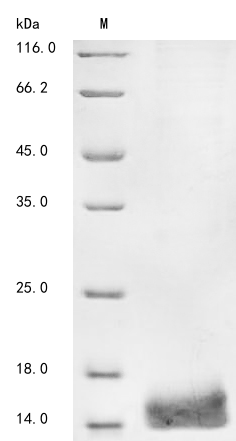Recombinant Mouse Phospholipase A-2-activating protein (Plaa), partial
In Stock-
中文名稱(chēng):小鼠Plaa重組蛋白
-
貨號(hào):CSB-BP018107MO
-
規(guī)格:¥3168
-
圖片:
-
其他:
產(chǎn)品詳情
-
純度:Greater than 85% as determined by SDS-PAGE.
-
基因名:
-
Uniprot No.:
-
別名:Plaa; Plap; Phospholipase A-2-activating protein; PLA2P; PLAP
-
種屬:Mus musculus (Mouse)
-
蛋白長(zhǎng)度:Partial
-
來(lái)源:Baculovirus
-
分子量:13.6 kDa
-
表達(dá)區(qū)域:495-584aa
-
氨基酸序列TGAGRYMPGSAGMDTTMTGVDPFTGNSAYRSAASKTVNIYFPKKEALTFDQANPTQILGKLKELNGTAPEEKKLTEDDLVLLEKILSLIC
Note: The complete sequence including tag sequence, target protein sequence and linker sequence could be provided upon request. -
蛋白標(biāo)簽:N-terminal 10xHis-tagged and C-terminal Myc-tagged
-
產(chǎn)品提供形式:Liquid or Lyophilized powder
Note: We will preferentially ship the format that we have in stock, however, if you have any special requirement for the format, please remark your requirement when placing the order, we will prepare according to your demand. -
緩沖液:If the delivery form is liquid, the default storage buffer is Tris/PBS-based buffer, 5%-50% glycerol.
Note: If you have any special requirement for the glycerol content, please remark when you place the order.
If the delivery form is lyophilized powder, the buffer before lyophilization is Tris/PBS-based buffer, 6% Trehalose. -
儲(chǔ)存條件:Store at -20°C/-80°C upon receipt, aliquoting is necessary for mutiple use. Avoid repeated freeze-thaw cycles.
-
保質(zhì)期:The shelf life is related to many factors, storage state, buffer ingredients, storage temperature and the stability of the protein itself.
Generally, the shelf life of liquid form is 6 months at -20°C/-80°C. The shelf life of lyophilized form is 12 months at -20°C/-80°C. -
貨期:3-7 business days
-
注意事項(xiàng):Repeated freezing and thawing is not recommended. Store working aliquots at 4°C for up to one week.
-
Datasheet & COA:Please contact us to get it.
相關(guān)產(chǎn)品
靶點(diǎn)詳情
-
功能:Plays a role in protein ubiquitination, sorting and degradation through its association with VCP. Involved in ubiquitin-mediated membrane proteins trafficking to late endosomes in an ESCRT-dependent manner, and hence plays a role in synaptic vesicle recycling. May play a role in macroautophagy, regulating for instance the clearance of damaged lysosomes. Plays a role in cerebellar Purkinje cell development. Positively regulates cytosolic and calcium-independent phospholipase A2 activities in a tumor necrosis factor alpha (TNF-alpha)- or lipopolysaccharide (LPS)-dependent manner, and hence prostaglandin E2 biosynthesis.
-
基因功能參考文獻(xiàn):
- We demonstrate that PLAA is essential for neural function, through dual roles of (1) regulating post-endocytic trafficking of signaling receptors necessary for neural development and (2) directing sorting of synaptic vesicle (SV) components during recycling, essential for synaptic function. PMID: 28413018
- miR-203 may regulate expression of the novel nociceptive mediator PLAA after incision. PMID: 22846677
- Phospholipase A2 activating protein is required for 1alpha,25-dihydroxyvitamin D3 dependent rapid activation of protein kinase C via Pdia3 PMID: 22484374
-
亞細(xì)胞定位:Nucleus. Cytoplasm. Cell junction, synapse.
-
蛋白家族:WD repeat PLAP family
-
組織特異性:Expressed in the brain, with highest levels in hippocampal neurons, cerebellar granular cell layer and Purkinje cells.
-
數(shù)據(jù)庫(kù)鏈接:
Most popular with customers
-
Recombinant Human Tumor necrosis factor ligand superfamily member 8 (TNFSF8), partial (Active)
Express system: Mammalian cell
Species: Homo sapiens (Human)
-
Recombinant Macaca fascicularis Membrane spanning 4-domains A1 (MS4A1)-VLPs (Active)
Express system: Mammalian cell
Species: Macaca fascicularis (Crab-eating macaque) (Cynomolgus monkey)
-
Recombinant Human Desmoglein-2 (DSG2), partial (Active)
Express system: Mammalian cell
Species: Homo sapiens (Human)
-
Recombinant Human CUB domain-containing protein 1 (CDCP1), partial (Active)
Express system: Mammalian cell
Species: Homo sapiens (Human)
-
Recombinant Human Oncostatin-M (OSM), partial (Active)
Express system: Mammalian cell
Species: Homo sapiens (Human)
-
Express system: Mammalian cell
Species: Homo sapiens (Human)

















